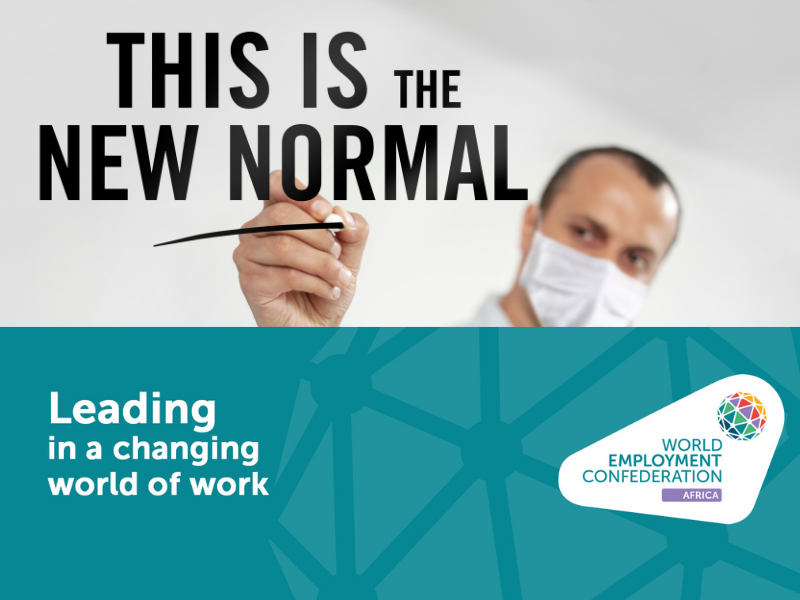
Opinion Piece
.....................
The latest feedback from national federations and industry leaders is that the outlook for flexible staffing – in both the short and longer-term – is extremely positive. At the same time, the need to ‘disentangle’ different types of flexibility (and different types of providers of this flexibility) has never been more important. In this new blog post, Tom Hadley walks us through five factors of change that will underpin the debate on different working arrangements in the so-called new-normal.
“Companies across different industries have the potential to reshape approaches to temporary labour and help to fuel their recoveries in the process”. This isn’t the latest missive from the fervent fans of flexibility within the global employment services sector; it is just one of the positive messages from a recent McKinsey report. Always good to hear external corroboration as we reposition the positive role of flexible staffing in an age of agility!
The latest feedback from national federations and industry leaders is that the outlook for flexible staffing – in both the short and longer term – is extremely positive. At the same time, the need to ‘disentangle’ different types of flexibility (and different types of providers of this flexibility) has never been more important. Below are five factors of change that will underpin the debate on different working arrangements in the so-called new-normal.
- Speed and agility will super-charge recovery – At a time of extreme volatility, access to flexible staffing arrangements is providing a crucial outlet for both employers and workers. This is a given in the current climate, but will this need for flexibility peter out as the crisis finally subsides? The answer is categorically no! In a ‘stop & go’ economy, agile workforce solutions will play a central and ongoing role. The driver will also come from workers themselves, with a premium placed on autonomy, variety and opportunity as well as flexibility. Looking ahead, speed and agility will supercharge the recovery. If McKinsey say so, it has to be true!
- The proof is in the doing – Positive messages and rallying slogans have their place; but what we have seen during the course of the Covid-19 crisis are concrete examples of employment services providers going the extra mile to look after the temporary and contract staff on their books. This has included a specific focus on Occupational Health & Safety which created the launch-pad for the World Employment Confederation’s Alliance project. And let’s not lose sight of the role that national federations played across the world in fighting tooth and nail to ensure that temporary and contract staff benefited from government support measures. Another example of showing rather than telling!
- The great disentanglement is underway – Flexibility that is delivered through responsible and compliant providers works for both workers and employers. This remains a core message. At the same time, the priority is to create a clear differentiation with other types of intermediaries (e.g. online platforms and recruitment apps). Harnessing technology and driving innovation are important ways forward but we need a regulatory level playing field in the interests of workers as well as compliant businesses. The opportunity for the global HR services sector is to lead the ‘great disentanglement’ and to help policy makers understand what responsible intermediation looks like and focus their attention on where the real problems lie!
- End-user perspectives are starting to move – According to the Mercer Global Talent Trends Report, 57% of organisations are redesigning the whole ‘work experience’ with areas such as flexibility, health and people-centricity identified as priorities. The opportunity is there for the HR services sector to ensure that this work experience revamp reflects the views and needs of all workers, irrespective of what type of contract they are on. The feedback from national federations and industry leaders is that we are starting to see positive change in the management of contingent workers. Good to hear!
- Social innovation will drive further progress – Ensuring that flexibility works fairly for individuals as well as for employers remains a priority and is at the heart of the global HR services sector’s drive for social innovation. Ongoing social dialogue at national and regional level – such as the cooperation established by the World Employment Confederation Europe and UNI Europa through the EU Sectoral Social Dialogue – is driving further progress in finding new ways to reconcile flexibility and security.
Finding the right balance between flexibility, security, well-being and individual choice will be a major topic as we rebuild post-COVID economies and labour markets. As part of this, the advocacy and campaigning work of national federations will be key to changing latent misperceptions and ensuring that regulatory frameworks are effective but proportionate. In the words of WEC President Bettina Schaller “The world of work is reinventing itself. In this evolving landscape, representative organisations must shape future employment policies and play the role of trusted partners to policymakers, workers and businesses’. Hear, hear. The New Normal provides a new platform for spreading the word on the joy of flex.









